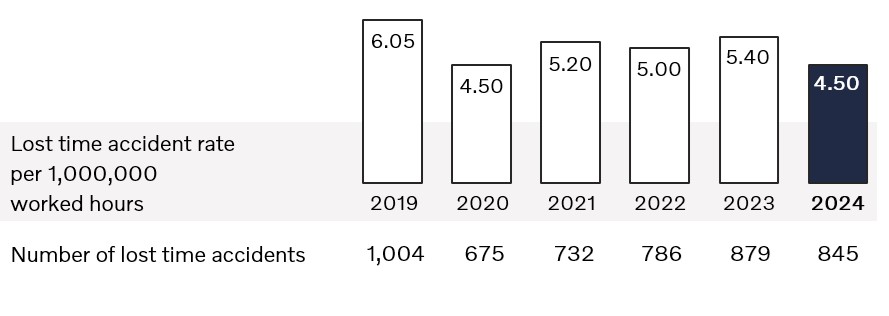Responsible Business
The transition to fossil-free and sustainable transport, mobility and infrastructure solutions is at the heart of everything we do at Volvo Group. This is where we can make the greatest impact as a company. But for us, being a sustainable business is about more than transportation solutions.
It’s about how we act and behave across our entire value chain: the solutions we provide to our customers, how we run our business, and where we source our energy and materials.
Our sustainability priorities
As a key player in the transport, mobility, and equipment industry, we need to drive improvements in several areas simultaneously. We have therefore set a strategy with targets and ambitions in three main areas where we can make a significant impact.
Sustainability summary 2024
Collaborating to drive change
As a signatory of the United Nations (UN) Global Compact and supporter of the UN 2030 Agenda for Sustainable Development, we consider global trends and challenges, international norms of responsible business behavior, and stakeholder expectations through our sustainability strategy when developing our work. Realizing that we cannot do everything on our own, we strive to use partnerships and other forms of collaborations to drive change broadly in our industry.
"Sustainability, like responsibility, is a choice. We understand the incredible growth potential the transition to net-zero offers, and the immediate climate and social impact we can make."
Regarding safety, our focus is on own operations and employees’ work situation but also a significant part of supplier requirements. In our own operations, the ambition is to continuously improve safety and reduce accident rates by 50% 2019-2030.

We work in close partnership with our supply chain partners, distributors and customers. At the same time, it is important for us to identify and mitigate sustainability risks with a focus on due diligence, building awareness and collaborations. Our human rights due diligence work includes specific actions in our own operations, with suppliers, business partners and screening of sales deals.
We believe in treating others with respect and in fair competition. Because in transparent markets without corruption, the best solutions win and companies dare to invest for the future. This includes compliance with laws and regulations, as well as the standards and ambitions that we set for our work.
We also believe that a vivid speak-up culture is a crucial element for the company’s success, can help uncover misconduct, and prevent violations of the law. Our Whistle-blower policy protects people raising concerns in good faith. In 2024, 401 concerns were escalated to our whistleblowing and global investigations function. Our Whistle-blower reporting line is open to our stakeholders to report a concern or to ask a question about our Code of Conduct.
We measure and report scope 1, 2 and the vast majority of scope 3 emissions.
In scope 1 and 2, we find our production, warehouses, technical centers and dealership locations.
In scope 3, the most significant area is use of sold products (scope 3.11). This accounts for over 95% of the emissions looking at the total GHG emission inventory.
These emissions that occur when our trucks, buses and machinery are driven and operated. This is also our customers’ scope 1 and 2 emissions, and usually their customers scope 3 emissions (transport and distribution).
Scope 3.11 is thus the focus of our business strategy, science-based climate targets and transition plan.
We increasingly invest in zero tailpipe emission technology. Our technology roadmap includes three main strategic levers:
- Battery electric technology
- Fuel cell electric
- Combustion technology using low carbon fuels
Together, this three-pronged approach helps to reduce emissions today, supports a safe and responsible transition, and enables net-zero transport by mid-century.
In our business, we are early in the transition and in 2024 around 2% of volumes were fully electric.
R&D to low carbon technology as defined in the EU Taxonomy were 27%.
The Volvo Group’s target is to have at least 35% fully electric sales 2030.
Our ambition is to be net-zero in our value chain by 2040. This will enable our customers to have zero emission fleets by 2050.